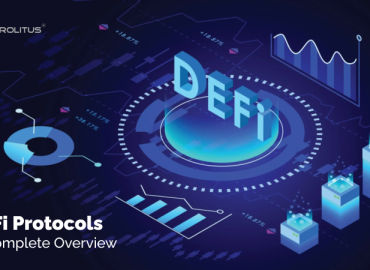Decentralized finance is not the new buzzword anymore; given its utility and plethora of use cases, it is touted as a strong competitor of conventional finance. This piece tries to dissect the intricacies of DeFi from a layman’s point of view and explains why the concept will soon be ordered into business in the financial world.
What is Decentralized Finance?
How is Decentralized Finance Different from Traditional Finance?
The concept of decentralized finance, as opposed to traditional finance, is actively contested. The two are essentially differentiated from one another by three aspects:
- A public blockchain serves as the trusted source in a decentralized financial system. This blockchain is used to control all of the operations that take place in the financial industry. In traditional finance, on the other hand, public governance, which includes laws and regulated financial organizations, is the trusted source and runs all of the processes.
- The concept of decentralized finance is gaining popularity for several reasons, one of which is that it is far clearer and more transparent than traditional finance. Because there are no admission requirements, anyone with some programming knowledge can participate in developing financial services and tools that run on top of the public blockchains.
- In contrast, the conventional financial system cannot accept the new trend since there are too many obstacles in the way, making it unlikely that they would. The need to get the right licences and permissions from the right authorities has made it harder for traditional financial systems to be innovative.
DeFi’s Operation
- Decentralized financial systems utilize the blockchain technology that underpins cryptocurrency. A blockchain can be thought of as a decentralized database or ledger that is encrypted. Applications called “dApps” are used to handle transactions and keep the blockchain running.
- Transactions are first recorded in blocks on the blockchain, which other users can independently check. If all of these verifiers come to the same conclusion about a transaction, the block will be closed and encrypted, and a new block will be created that will contain information about the prior block.
- The blocks are linked together, or “chained,” by the information contained in each subsequent block; this is where the term “blockchain” comes from. It is impossible to make changes to a blockchain because the information in earlier blocks cannot be altered without influencing the ones that come after them.
- This idea, in conjunction with other security mechanisms, is what gives a blockchain its reputation for being extremely secure. Because there is so much room for innovation in the technology behind digital ledgers, DeFi is a trustworthy tool for the development of new financial products in the future.
DeFi Protocols
Distributed ledgers identical to those used in cryptocurrency are the basis for a new financial technology called decentralized finance (DeFi). There is no longer a monopoly on money, financial products, or financial services held by banks and other institutions.
DeFi protocols are automated programs developed to solve problems in the traditional financial sector. And over half of the world’s population does not have access to a bank account, and the DeFi protocol attempts to change that.
The innovation of DeFi protocols would allow the door to be opened to implementing more financial products. Many DeFi protocols are now part of a larger ecosystem that includes a slew of well-known tokens and initiatives. The big rise in value of these protocols is good news for companies that want to start up in the DeFi space.
Venture capitalists are paying attention to a new industry that has the potential to reach more than half of the entire world’s population lacking a bank account soon. Huge amounts of money have been invested in various initiatives.
The industry has more than $9 billion in secured assets. Also, these projects create liquidity between different blockchains and assets that are not on the blockchain, such as stocks and shares, to encourage more people to use cryptocurrencies.
Decentralized Exchanges and Decentralized Markets
Peer-to-peer marketplaces, often defined as decentralized exchanges or DEXs, are peer-to-peer environments in which cryptocurrency investors engage in direct transactions without entrusting the administration of their assets to an intermediary or keeper. Decentralized exchanges are indeed called DEXs.
Using agreements that can carry out their terms and that are encoded in code and known as “smart contracts” helps make these transactions possible. Users can conduct transactions straight from their wallets on decentralized exchanges by using the smart contracts underpinning the trading platform.
Traders are accountable for the safety of their funds and bear the consequences if they mishandle them in any way, including misplacing their secret keys or transferring money to the wrong locations. Customers who deposit dollars or assets receive an “I owe you” (IOU) note that may be freely sold on the network using decentralized exchange portals.
These IOUs serve as a form of credit. An IOU is simply a token that is built on blockchain technology and has the equivalent value to the item that it represents. On top of the biggest blockchains, which accept smart contracts, prominent decentralized markets and exchanges have been established in recent years.
DeFi’s Future
In recent years, various macroeconomic and technological variables have been contributing to the exponential expansion of the decentralized finance (DeFi) industry. Decentralized finance (DeFi) is rapidly developing and expanding to mimic the ecology of traditional financial services.
This can take the shape of decentralized exchanges, the lending, and borrowing of various kinds of assets, or insurance products. A newly decentralized blockchain system dealing in cryptocurrencies like DeFi is extremely hazardous because you’re utilizing a new technology to destabilize an established organization.
This innovative form of decentralized financial technology may ultimately affect the fate of centralized financial companies, with DeFi having the potential to be perceived as an option that is less expensive, timelier, and more pertinent. It is essential to have a thorough understanding of the benefits and drawbacks associated with using DEXs and taking part in DeFi.
Most importantly, you should do research on any protocols you want to use, making sure you understand the risks, how security and privacy work, including how encryption keys work, and that you keep your assets safe in a wallet that doesn’t need a custodial institution.
How Prolitus Can Help You With Building a DeFi Solution
Prolitus has developed custom Defi solutions for global clients long enough to realize that you need business expertise, not just coding specialists. Prolitus offers the best DeFi solutions for codebases and libraries through a team of skilled developers who know and have used specific methods.
We begin with your needs and then determine the appropriate instruments. You are welcome to attend meetings, you will receive regular updates, and your input is crucial. We develop solutions for your company.
Your business doesn’t stand still. Neither do we. We are always learning and getting better so that we can give you the best advice and services.
Final Thoughts
One must be cautious when getting into DeFi further than the fundamentals of crypto trading, and make sure your counterparty is reliable before you begin. Keep in mind that DeFi’s yields are appealing, but don’t overlook the additional hazards. Even insignificant gains from yield farming can be quickly erased by a drop in bitcoin markets, and outright fraud or theft can cause even more harm. There will be many more modifications to this venture. Decentralized finance, on the other hand, may be more effective, easy, and safer than traditional financing. How traditional financial actors respond when DeFi profits start to degrade will be fascinating to watch in the future.
FAQ’s
What Is the Objective of Decentralized Finance?
DeFi was created to do away with the need for intermediaries in monetary dealings.
Does Bitcoin Provide Decentralized Finance?
Bitcoin is a form of digital money. It’s not so much that Bitcoin is a part of DeFi as it is that it’s being developed to use cryptocurrencies within its ecosystem.
What is the total value of the DeFi system?
The aggregate of all cryptocurrencies that have been staked, borrowed, placed in a pool, or utilized for any other type of financial transaction across the entirety of DeFi is referred to as the total value locked (TVL). As a monetary unit, it can be used to represent the total value of many digital currencies, like ether or bitcoin.





